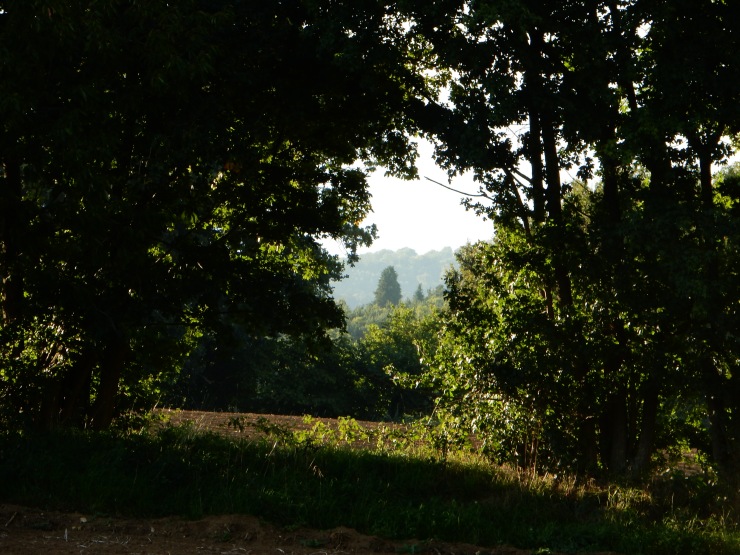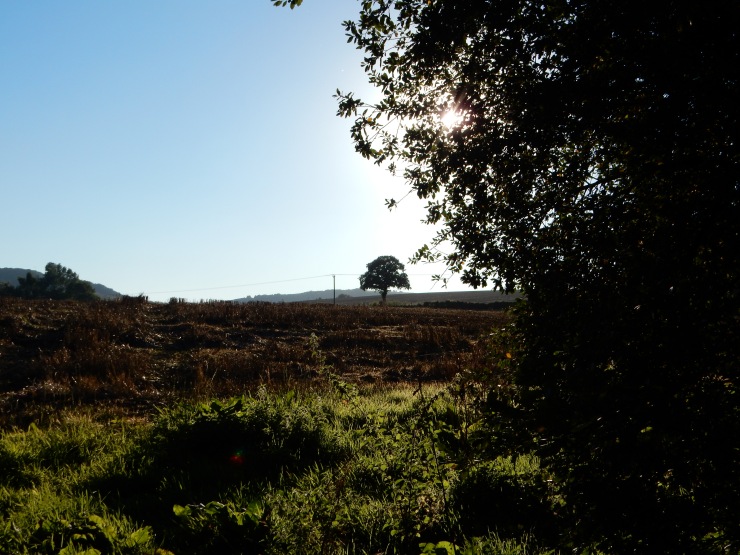The quietest ‘groan’, for Emily Brontë, could suggest that earthly sorrow has an absolute quality:
One hardly uttered groan –
But that has hushed all vocal joy,
Eclipsed the glory of the sky
And made me think that misery
Rules in our world alone! (Brontë: 172)
In Brontë’s poem ‘The Two Children’, absolute sorrow appears as the fated sorrow of the figure destined to a ‘grim fate’ (216), who – as Janet Gezari comments in the notes to her edition of Brontë’s poems – ‘anticipates Heathcliff, bereft of Guardian Angel or “kindred kindness”‘ (277).
Soul – where kindred kindness,
No early promise woke,
Barren is thy beauty,
As weed upon a rock. (217)
One of Brontë’s most devastating quatrains returns to how grief, like a lack of kindred kindness, results in a complete stilling of joy, as trauma decisively inhibits our capacity for experience:
In dungeons dark I cannot sing
In sorrow’s thrall ’tis hard to smile
What bird can soar with broken wing
What heart can bleed and joy the while (78)
The close of another poem pairs fated obscure sorrow or sorrowful obscurity – ‘it is doomed’ – with the way in which bereavement stunts early development: the organic growth of a child’s emotional life. As Gezari remarks, ‘the feeling is very different’ (242) here to in the comparable lines from Gray’s Elegy (‘Full many a flower is born to blush unseen/ And waste its sweetness on the desert air’); because in Brontë’s lines it is only specifically the bereaved environment which has turned the child’s morning light into a preparation for perpetual night.
Cut off from hope in early day
From power and glory cut away
But it is doomed and morning’s light
Must image forth the scowl of night
And childhood’s flower must waste its bloom
Beneath the shadow of the tomb (42)
The poem ‘At Castle Wood’ again focusses on the early stilling of emotional life attendant upon a sorrowful upbringing, when ‘[…] I was bred the mate of care/ The foster child of [sore] distress’: ‘The heart is dead since infancy’ (155). The protagonist in ‘H. A. and A. S.’ comments of ‘mortal grief’ that it ‘never heals with years’ (139); Gezari’s notes compare Brontë’s lines ‘For Time and Death and Mortal pain/ Give wounds that will not heal again’ (268, quoting 132). The following lines appear in a ‘Song’ dated 1844.
I ween, that when the grave’s dark wall
Did first her form retain;
They thought their hearts could ne’er recall
The light of joy again. (11)

The emphasis on unhealing grief is distinctively Brontë’s. In her landmark study of Brontë’s poems, Last Things, Gezari observes that ‘[u]nlike the speakers of the English elegies [Peter] Sacks studies’, the speaker in Brontë’s ‘Remembrance’ ‘does not turn away from death and toward life after a circumscribed period set aside for grieving’, and instead ‘asks whether such a turning is possible’ (Gezari: 53). That poem points towards an awareness that ‘finality and composure in the face of deep and irrevocable loss are unattainable’ (44). Likewise in Wuthering Heights Brontë represents, with the indivisible pair Catherine and Heathcliff, ‘an unresolved and inconclusive melancholy mourning’ (114).
At this point, however, we need to think about ‘For him who struck thy foreign string’, a poem dated 1838 which was published by Charlotte Brontë in 1850 under her title ‘The Lady to Her Guitar’:
For him who struck thy foreign string
I ween this heart hath ceased to care
Then why dost thou such feelings bring
To my sad spirit, old guitar?
It is as if the warm sunlight
In some deep glen should lingering stay
When clouds of tempest and of night
Had wrapped the parent orb away –
It is as if the glassy brook
Should image still its willows fair
Though years ago the woodman’s stroke
Laid low in dust their gleaming hair:
Even so, guitar, thy magic tone
Hath moved the tear and waked the sigh
Hath bid the ancient torrent flow
Although its very source is dry! (78)
The loss of the loved one, or alienation of the love object from the poem’s speaker, has inhibited the speaker’s emotional life seemingly absolutely: at ‘its very source’. As Gezari writes, this poem finds Emily Brontë ‘again creating a world without end where effects outlast their causes so that whatever was persists in a timeless present’. This visionary poem of unresolved mourning, Gezari notes, ‘shares Kubla Khan’s imagery of sunny spots enclosed by antique forests’ along with ‘shapes hovering on a watery surface’ (Gezari: 23). Yet in its resemblance too to the restorative natural sanctuary of the first poem published in Charlotte Brontë’s 1850 edition of her sister’s poems, ‘A little while, a little while’, the environment of the second stanza already suggests a less sorrowful kind of timelessness or persistence than that which we have tended to find in the poems. Here is how nature holds its light and lightens the speaker’s mood in the third and sixth stanzas of ‘A little while, a little while’:
There is a spot, ‘mid barren hills,
Where winter howls, and driving rain;
But, if the dreary tempest chills,
There is a light that warms again.
[…]
Still – as I mused – the naked room,
The alien firelight died away;
And from the midst of cheerless gloom,
I passed to bright, unclouded day. (Brontë: 203)

A closer look at Brontë’s poetic vocabulary further develops our awareness of how, as C. Day Lewis put it in a 1965 essay, the ‘struggle of the soul against predestined doom is one form which the freedom motif takes in Emily Brontë’s work’. In her textual notes Gezari observes that in ‘For him who struck thy foreign string’, Brontë’s use of the rare archaic verb ‘ween’, meaning ‘think’ or ‘surmise’, in the first stanza, recalls her other use of the word in the 1844 ‘Song’ already quoted (251). In the ‘Song’, ‘ween’ questions the absolute nature of the bereaved ones’ sorrow: the speaker only surmises that they thought themselves incapable of remembering joy. Similarly, ‘ween’ in ‘For him who struck thy foreign string’ leads us to wonder, already immediately at the beginning of the poem, whether the speaker’s heart actually has ‘ceased to care’ for the guitarist, and whether the speaker’s emotional life really is absolutely inhibited. In the second stanza the use of ‘wrapped’, meaning only ‘concealed’ or ‘absorbed’ (251, 242), undermines the finality of the loss of the ‘parent orb’.
It is also worth considering the final stanza of the poem, which appears to present music, or the guitarist’s musical imagination, as enabling the rebirth of the speaker’s emotional life. In her discussion of the vital principle affirmed by Brontë in ‘No coward soul is mine’ – the principle which ‘Pervades and broods above,/ Changes, sustains, dissolves, creates and rears’ (182) – Gezari argues that Brontë there ‘uses the vocabulary Coleridge had used to describe the secondary imagination’ in his Biographia Literaria :
It dissolves, diffuses, dissipates, in order to recreate; or where this process is rendered impossible, yet still, at all events, it struggles to idealize and to unify. It is essentially vital, even as all objects (as objects) are essentially fixed and dead. [Gezari: 131, quoting Coleridge]
The key distinction between Coleridge’s language and Brontë’s, as Gezari notes, is Brontë’s substitution of ‘creates’ for ‘recreate’. ‘In Brontë’s poetic universe, living forms may be newly created, not just recreated as in Coleridge’s.’ (132) It seems to me that this statement applies too to the final stanza of ‘For him who struck thy foreign string’, in which the speaker’s emotional life, even when its ‘very source’ is presently ‘dry’ (just like Coleridge’s ‘essentially fixed and dead’ objects), can in actuality be newly created – not just reborn – by the influence of the guitarist’s musical imagination.
Texts
Emily Jane Brontë, The Complete Poems, ed. by Janet Gezari (London: Penguin, 1992)
Janet Gezari, Last Things: Emily Brontë’s Poems (Oxford: OUP, 2007)



